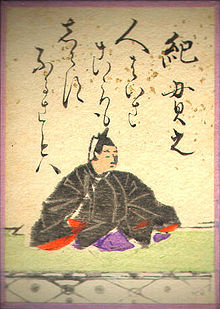
Poetic diary (歌日記, uta nikki) or Nikki bungaku (日記文学) is a Japanese literary genre, dating back to Ki no Tsurayuki's Tosa Nikki, compiled in roughly 935. Nikki bungaku is a genre including prominent works such as the Tosa Nikki, Kagerō Nikki, and Murasaki Shikibu Nikki. While diaries began as records imitating daily logs kept by Chinese government officials, private and literary diaries emerged and flourished during the Heian period (794–1192 AD).
The English term poetic diary was used by the Princeton University scholar/translator Earl Miner in his book, Japanese Poetic Diaries. Traditionally, composed of a series of poems held together by prose sections, the poetic diary has often taken the form of a pillow book or a travel journal. Since World War II, Beat Generation writers in the United States such as Gary Snyder, Jack Kerouac, Philip Whalen, and Joanne Kyger, as well as post-beat writers such as Andrew Schelling and Michael Rothenberg have studied and written in Western-style poetic diary form.